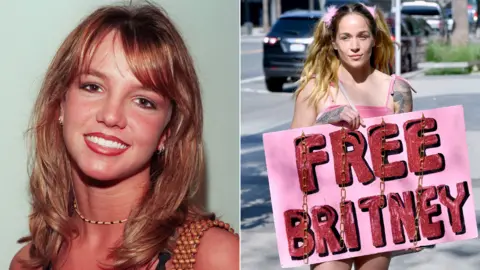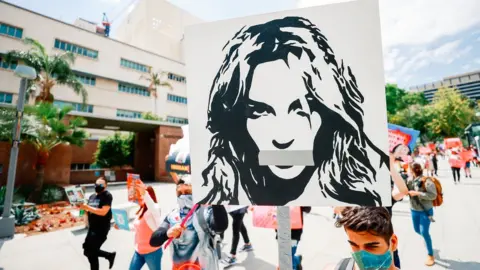Britney Spears: Does the latest documentary tell us anything new?
 Getty Images
Getty ImagesA new BBC documentary about Britney Spears is the latest attempt to shed light on the conservatorship she has been under since 2008. But does it tell us anything new about what's going on behind the scenes?
You wait ages for a Britney Spears documentary, and then four come along at once.
The New York Times kicked off the Britney bandwagon with the February release of Framing Britney Spears - a 75-minute film which examined how the singer has been treated by the media and those around her over the years. There wasn't necessarily much new information about her current situation or state of mind, but that didn't matter - its impact was seismic.
The well-chosen archive footage prompted a new wave of social media scorn for the journalists and chat show hosts who sexualised or upset her in those early years of fame. It even elicited an apology from her ex-boyfriend Justin Timberlake for his previous behaviour towards her.
Framing Britney Spears also shone a spotlight on the conservatorship the singer has been under since 2008. The arrangement means she is not in control of large parts of her life, particularly her financial affairs, after a very public breakdown. Such orders are usually put in place by judges to protect people who are physically infirm or mentally unstable.
There are two separate conservatorships - one for Britney as a person and one for her estate. Her father Jamie Spears was initially put in charge of both. However, he stepped down as her personal conservator in 2019 due to personal health reasons, and a temporary conservator took over. He still has control of her estate, but a judge has ordered he share responsibility with a financial management company.
 Getty Images
Getty ImagesRumours, campaigns and conspiracy theories have swirled around the case in recent years, with Britney's fans scrutinising her erratic social media posts for apparent clues about her condition. Very few people, however, genuinely know all the details of what's going on. And that is precisely what makes the subject such catnip for documentary makers.
In light of the renewed interest, Netflix commissioned their own Britney film, which is currently in development. Reports also emerged of a separate documentary Britney is said to be working on herself with an as-yet-unannounced female director.
For now, though, we've got The Battle for Britney: Fans, Cash and a Conservatorship, released on BBC iPlayer on Saturday and due to air on BBC Two next week. It's been made by filmmaker Mobeen Azhar, who previously won a Bafta as a producer of the series Muslims Like Us.
The problem facing all journalists examining this case, including Azhar, is that very few of them succeed in getting anywhere close to the action. There is a tight circle around Britney and most filmmakers come up against brick walls when they try to reach her. She is, appropriately, Overprotected.
In this regard, Azhar does at least have something that many of his fellow journalists lack: He was granted access to one of Britney's conservatorship hearings in December 2020. We, the viewers, are informed of this at the beginning of the documentary, and for the next hour we wait patiently for this climax, hearing from a variety of talking heads along the way.

Many of the usual suspects are here - celebrity blogger Perez Hilton crops up to apologise (again) for his treatment of Britney at the height of his website's popularity. Jordan Miller, the founder of fan site Breathe Heavy, discusses how he first coined the phrase "Free Britney", which was later adopted as the hashtag and slogan of fan campaigns.
The documentary isn't afraid, though, to show the dark side of the fandom. Choreographer Brian Friedman reveals he quit working for Britney after receiving "multiple death threats weekly" from fans, which he says were due to a comment he made in an interview about how the star's dance moves had changed after becoming a mother. "That, to me, was no longer fun, so I decided to bow out gracefully," he explains. "I wished Britney the best, and I then walked away, and my ulcer went away."
It also explores whether the conservatorship had any positive impacts on her life. During an interview filmed at his Los Angeles home, Hilton says: "If she didn't have a conservatorship in place, I would be concerned that Britney would be dead, truly." This is a strand of opinion often lacking from the debate; and it's worth remembering Britney recorded albums, toured the world and sustained a successful Las Vegas residency while under the conservatorship.
But it's very clear that she was no longer happy with her father being in control of many aspects of her life, and that, understandably, is all that matters to her followers. The documentary sees Azhar speaking to the dedicated fans who have rigorously campaigned for her to be granted her independence.
Jamie Spears has said that Britney has always had the right to request an end to the conservatorship, which she has never exercised. Indeed, she has previously referred to the arrangement as "voluntary".

The filmmaker also interviews make-up artist Billy Brasfield, who claims to still be in regular contact with the 39-year-old. "She wants to be able to drive her car when she wants to. In her conservatorship, she does not have that right," he says.
To Azhar's credit, nearly all of the documentary is made up of new interviews and footage. He doesn't rely too heavily on archive material and some of what he finds is genuinely enlightening.
His trip to Britney's hometown, Kentwood in Louisiana, sees him speak to staff at her favourite restaurant, who talk about the polite girl, oblivious to her own worldwide fame, who continued to visit long after she became successful. "Sweet girl, I've met her several times," one waitress tells him. "She's a down-to-earth person. If you didn't know who she was, you would think she was just a regular customer coming in."
He visits a museum dedicated to her, packed with memorabilia and fan art, owned by a woman who says she gets upset by any negative coverage of her home-town hero. Blame is often, and often rightly, placed on the media when it comes to Britney. But one photographer tells Azhar he doesn't regret his pursuit of her, and suggests Britney always knew how to use the paparazzi to her advantage.
Eventually, we reach the day of the conservatorship hearing. The cameras, naturally, aren't allowed in, but Azhar does a piece-to-camera immediately afterwards to summarise what took place. He describes it as "two hours of dry legal debate", during which Britney's father Jamie dialled in remotely, and notes that there's no discussion about whether or not the conservatorship should end. "It felt like the only people winning were the lawyers," he notes.
The Battle for Britney is interesting and enjoyable - you wouldn't regret giving it an hour of your time. But for those who have been closely following the story in recent years, it doesn't really tell us anything new. We're no further forward in understanding Britney's state of mind, and still haven't heard directly from the key players in the case.
"I don't have any clue what's going to happen with Britney's conservatorship, and no-one that you've spoken to probably does either," Hilton observes at one point, correctly.
That could be about to change. Earlier this week, Britney's lawyer announced the singer had requested to "address the court directly" at a forthcoming conservatorship hearing in June. That could potentially offer some insight, assuming it happens.
For now, however, Britney isn't talking to the media. Even if a filmmaker were to get the holy grail - an interview with the woman herself - there's still no guarantee we'd get the full picture. Would she genuinely be free to speak her mind?
In the absence of the details they need, these documentaries generally hover around the edges, examining the surrounding circus more than the story at the centre of it. They have put the singer firmly back in the headlines, this time accompanied by an outpouring of support and sympathy from the general public. But Britney openly admitted on her Instagram page that she was upset by the release of Framing Britney Spears, which raises questions about how much the additional public attention is helping her, even if it is largely on her side.
 Getty Images
Getty Images